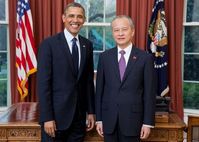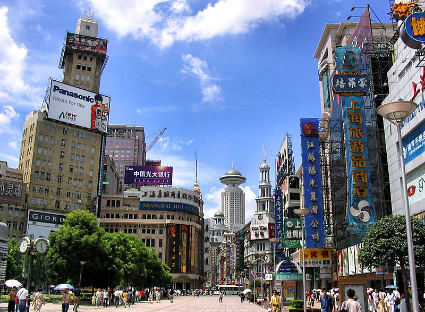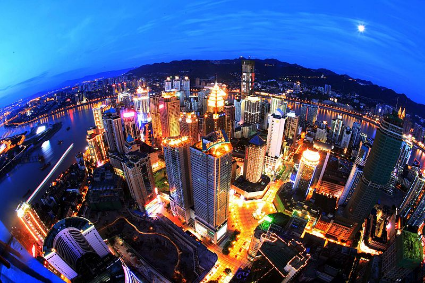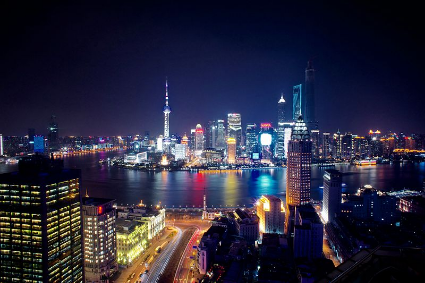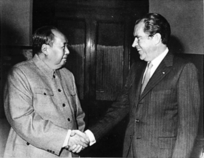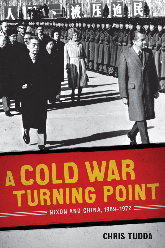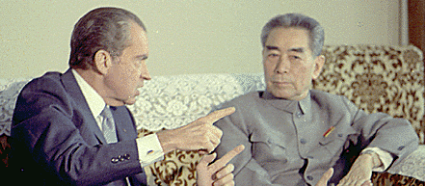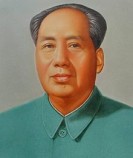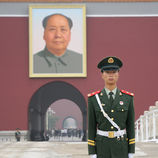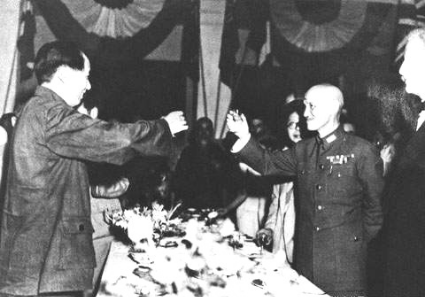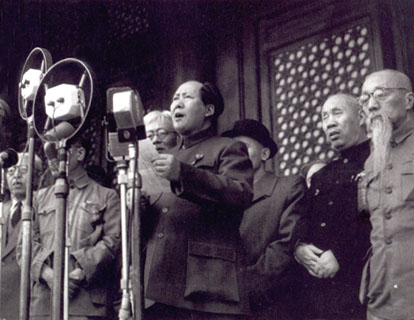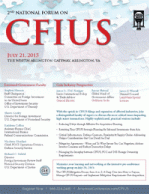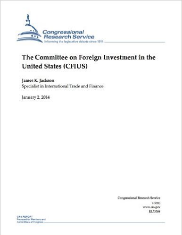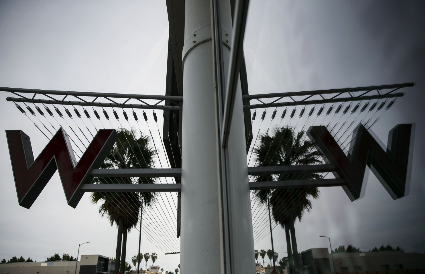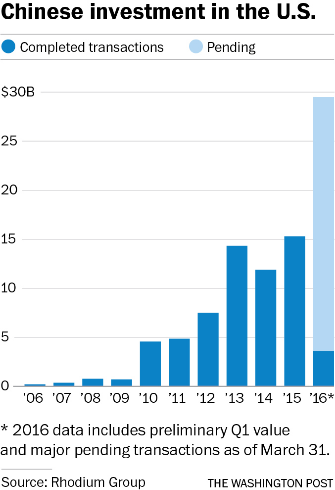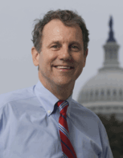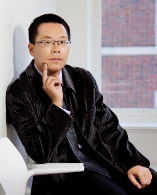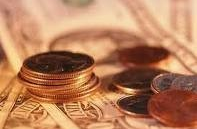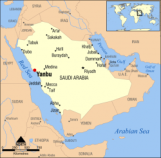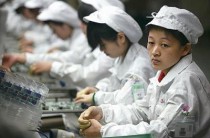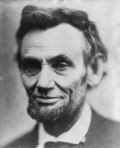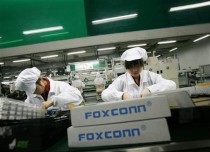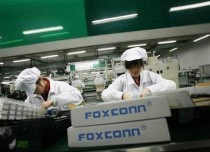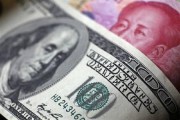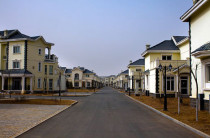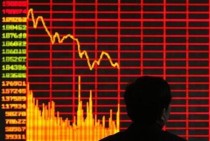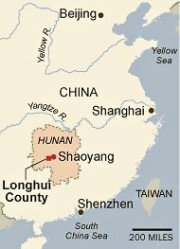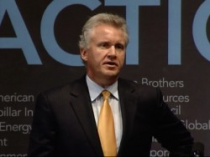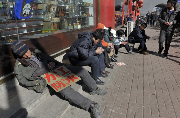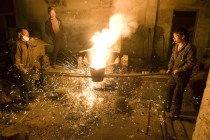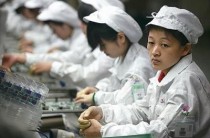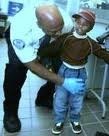The United States and China
Chinese Embassy in the United States of America
Ambassador Cui Tiankai
Welcome to the website of the Chinese Embassy in the USA.
President Obama and Chinese Ambassador Cui Tiankai.
Chinese Ambassador Cui Tiankai: "China is the largest developing country in the world while the United States is the largest developed one. A stable and growing China-US relationship not only serves the fundamental interests of the two countries and peoples, but also contributes to peace and development of the Asia-Pacific region and the world at large". Read more
China: Officially The People's Republic of China (PRC)
Wikipedia
China, officially the People's Republic of China (PRC), is a state in Asia. With a population of over 1.38 billion,[15] the state is the world's most populous. The PRC is governed by the Communist Party of China, with its seat of government in the capital city of Beijing.[16] It exercises jurisdiction over 22 provinces; five autonomous regions; four direct-controlled municipalities (Beijing, Tianjin, Shanghai and Chongqing); two mostly self-governing special administrative regions (Hong Kong and Macau); and claims sovereignty over Taiwan.
Covering approximately 9.6 million square kilometers, China is the world's second largest state by land area,[17] and either the third or fourth-largest by total area, depending on the method of measurement.[i] China's landscape is vast and diverse, ranging from forest steppes and the Gobi and Taklamakan deserts in the arid north to subtropical forests in the wetter south. The Himalaya, Karakoram, Pamir and Tian Shan mountain ranges separate China from South and Central Asia. The Yangtze and Yellow Rivers, the third- and sixth-longest in the world, run from the Tibetan Plateau to the densely populated eastern seaboard. China's coastline along the Pacific Ocean is 14,500 kilometres (9,000 mi) long, and is bounded by the Bohai, Yellow, East and South China Seas.
China is a cradle of civilization, with its known history beginning with an ancient civilization – one of the world's earliest – that flourished in the fertile basin of the Yellow River in the North China Plain. For millennia, China's political system was based on hereditary monarchies known as dynasties. Since 221 BCE, when the Qin Dynasty first conquered several states to form a Chinese empire, the state has expanded, fractured and reformed numerous times. The Republic of China (ROC) replaced the last dynasty in 1912, and ruled the Chinese mainland until 1949, when it was defeated by the Communist Party of China in the Chinese Civil War. The Communist Party established the People's Republic of China in Beijing on 1 October 1949, while the ROC government relocated to Taiwan with its present capital in Taipei. Both the ROC and PRC continue to claim to be the legitimate government of all China.
China had the largest economy in the world for most of the past two thousand years, during which it has seen cycles of prosperity and decline.[18][19] Since the introduction of economic reforms in 1978, China has become one of the world's fastest-growing major economies. As of 2014, it is the world's second-largest economy by nominal total GDP and largest by purchasing power parity (PPP). China is also the world's largest exporter and second-largest importer of goods.[20] China is a recognized nuclear weapons state and has the world's largest standing army and second-largest defence budget.[21][22] The PRC has been a United Nations member since 1971, when it replaced the ROC as a permanent member of the U.N. Security Council. China is also a member of numerous formal and informal multilateral organizations, including the WTO, APEC, BRICS, the Shanghai Cooperation Organization (SCO), the BCIM and the G-20. China is a great power and a major regional power within Asia, and has been characterized as a potential superpower. Read more
1972 Nixon visit to China - week that changed the world
1972 Nixon visit to China
Wikipedia
U.S. President Richard Nixon's 1972 visit to the People's Republic of China was an important step in formally normalizing relations between the United States and China. It marked the first time a U.S. president had visited the PRC, which at that time considered the U.S. one of its foes, and the visit ended 25 years of separation between the two sides.
Before even being elected president, Nixon had talked of the need for better relations with the PRC, with which the U.S. did not maintain diplomatic relations as it recognized the government of the Republic of China on Taiwan as the government of China. Early in his first term, Nixon and National Security Adviser Henry Kissinger began sending subtle overtures hinting at warmer relations to the PRC government. After a series of these overtures by both countries, Kissinger flew on secret diplomatic missions to Beijing, where he met with Premier Zhou. On July 15, 1971, the President announced that he would visit the PRC the following year.
Occurring from February 21 to 28, 1972, the visit allowed the American public to view images of China for the first time in over two decades. Throughout the week the President and his most senior advisers engaged in substantive discussions with the PRC, including a meeting with Chairman Mao Zedong, while First Lady Pat Nixon toured schools, factories and hospitals in the city of Beijing, Shanghai and Hangzhou with the large American press corps in tow. Nixon dubbed the visit "the week that changed the world."
The repercussions of the Nixon visit were vast, and included a significant shift in the Cold War balance, putting the PRC with the U.S. against the Soviet Union. "Nixon going to China" has since become a metaphor for an unexpected or uncharacteristic action by a politician. Read more
A Cold War Turning Point
Nixon and China, 1969-1972
LSU Press by Chris Tudda
In February 1972, President Nixon arrived in Beijing for what Chairman Mao Zedong called the "week that changed the world." Using recently declassified sources from American, Chinese, European, and Soviet archives, Chris Tudda’s A Cold War Turning Point reveals new details about the relationship forged by the Nixon administration and the Chinese government that dramatically altered the trajectory of the Cold War.
Nixon’s Great Decision on China, 40 years later Washington Post
The Nixon Visit February 21-28, 1972 American Experience PBS
Revisiting Nixon in China Opera News Magazine
Mao Zedong
Wikipedia
Mao Zedong also transliterated as Mao Tse-tung and commonly referred to as Chairman Mao (December 26, 1893 – September 9, 1976), was a Chinese Communist revolutionary, and the founding father of the People's Republic of China, which he governed as Chairman of the Communist Party of China from its establishment in 1949 until his death in 1976. His Marxist–Leninist theories, military strategies, and political policies are collectively known as Marxism–Leninism–Maoism or Mao Zedong Thought.
Born the son of a wealthy farmer in Shaoshan, Hunan, Mao adopted a Chinese nationalist and anti-imperialist outlook in early life, particularly influenced by the events of the Xinhai Revolution of 1911 and May Fourth Movement of 1919. Mao converted to Marxism–Leninism while working at Peking University and became a founding member of the Communist Party of China (CPC), leading the Autumn Harvest Uprising in 1927. During the Chinese Civil War between the Kuomintang (KMT) and the CPC, Mao helped to found the Red Army, led the Jiangxi Soviet's radical land policies and ultimately became head of the CPC during the Long March. Although the CPC temporarily allied with the KMT under the United Front during the Second Sino-Japanese War (1937–45), after Japan's defeat China's civil war resumed and in 1949 Mao's forces defeated the Nationalists who withdrew to Taiwan. Read more
Shared interests of the U.S. & China - 2016 and beyond
Committee on Foreign Investment in the United States
The Committee on Foreign Investment in the United States
(CFIUS)
CFIUS is an inter-agency committee authorized to review transactions that could result in control of a U.S. business by a foreign person ("covered transactions"), in
order to determine the effect of such transactions on the national security of the United States. CFIUS operates pursuant to section 721 of the Defense Production Act of 1950, as amended by the
Foreign Investment and National Security Act of 2007 (FINSA) (section 721) and as implemented by Executive Order 11858, as amended, and regulations at 31 C.F.R. Part 800.
The CFIUS process has been the subject of significant reforms over the past several years. These include numerous improvements in internal CFIUS procedures, enactment of FINSA in July 2007,
amendment of Executive Order 11858 in January 2008, revision of the CFIUS regulations in November 2008, and publication of guidance on CFIUS’s national security considerations in December 2008.
Further information about each of these reforms is available via the links below. Read more
Committee on Foreign Investment in the United States
Committee on Foreign Investment in the United States
Wikipedia
The Committee on Foreign Investment in the United States (CFIUS, commonly pronounced "sifius") is an inter-agency committee of the United States Government that reviews the national security implications of foreign investments in U.S. companies or operations. Chaired by the United States Secretary of the Treasury, CFIUS includes representatives from 16 U.S. departments and agencies, including the Defense, State and Commerce departments, as well as (most recently) the Department of Homeland Security. CFIUS was established by President Gerald Ford's Executive Order 11858 in 1975. President Reagan delegated the review process to the Committee on Foreign Investment in the United States with the Executive Order 12661 in 1988. This was in response to U.S. Congress giving authority to the President to review foreign investments, in the form of Exon-Florio Amendment.
Congressional Research Service - CFIUS
The Committee on Foreign Investment in the United States
Congressional Research Service
By James K. Jackson
Specialist in International
Trade and Finance
February 19, 2016
RL33388 Congressional Research Service C[...]
Adobe Acrobat document [826.0 KB]
The Chinese want to buy more American companies — and we should let them - The Washington Post
The Chinese want to buy more American companies — and we should let them
The Washington Post
By Zachary Karabell
April 1, 2016
China was poised to make its largest-ever investment in the United States this past week, after the Chinese insurance group Angbang topped Marriott in a bidding war for the Starwood hotel chain. The offer was extremely attractive: $14 billion in cash. But a chorus of skeptics urged Starwood to say no.
Who are these guys?" Bloomberg News anchor Tom Keene asked. "It’s the Butch Cassidy analysis here. I have absolutely no clue what their balance sheet is. I have no clue how they’re going to finance this puppy. And more than anything: What’s their link to the Chinese government?"
Over at MarketWatch, columnist Tim Mullaney wrote: "Anbang’s CEO is no less than the son-in-law of deceased former Chinese leader Deng Xiaoping. While still an also-ran in China’s insurance market, it has easily arranged changes in that nation’s regulations to let it invest more in asset management and offshore real estate. They couldn’t get better service from Beijing if they invited the Communist Party’s central committee to the wedding."
he deal also faced scrutiny from the powerful but obscure Committee on Foreign Investment in the United States (CFIUS), which is charged with assessing the national security implications of these sorts of transactions. Buying a hotel chain wouldn’t seem to present a particular threat. But Angbang’s purchase of New York’s Waldorf Astoria was reviewed in 2014. That deal ultimately got a green light, though the U.S. delegation to the United Nations moved its base of operations out of the hotel afterward.
Unfortunately, we’ll never know what regulators would have made of the Angbang-Starwood deal. On Thursday, the Chinese company announced that it was withdrawing its bid "due to various market considerations." The intense pushback certainly didn’t help — and it’s part of a troubling trend.
Suspicion of Chinese motives is hardly new. After all, blaming China for America’s economic ills has been a theme of the past three presidential elections. But within the U.S. government and business community, there’s intensifying concern — ranging from wrong but reasonable to paranoid and hysterical — that China’s drive to invest in the United States is not benign.
The far smarter response would be to embrace Chinese investment. Rather than being a threat to U.S. security, it’s the best way to reduce future tension.
As China’s economy and reserves have grown, so has its appetite for investing abroad. According to the Rhodium Group, in 2006, China did 39 deals worth $195 million in the United States. By 2015, that had mushroomed to 171 deals worth $15.3 billion. And already this year, Chinese investors have completed transactions in the United States totaling more than $3 billion, with an additional $26 billion in the pipeline.
China’s appetite encompasses multiple industries. The country’s State Council has encouraged companies to pick targets that will help "raise the international competitiveness of Chinese products," among other goals. Noteworthy deals that have gone through this year include General Electric’s $5.4 billion sale of its appliance division to Haier and Hollywood studio Legendary Entertainment’s $3.5 billion acquisition by Dalian Wanda (which already owns AMC Theaters).
But as Chinese deals in the United States have become more numerous and more ambitious, there’s been more resistance.
Acquisitions involving Chinese investors represent the largest portion — nearly 20 percent — of transactions reviewed by CFIUS, even though China still trails other countries in its direct investments in the United States. And members of Congress are pressing CFIUS to expand the scope of its reviews. For instance, Sen. Sherrod Brown (D-Ohio) wrote a letter last month asking the committee to look at patterns of investment, ownership structure and "all possible mitigation measures to protect Americans." Previously, Rep. Rosa DeLauro (D-Conn.) introduced a bill requiring regulators to assess economic and public health impacts.
Sherrod Brown
Wikipedia
Sherrod Campbell Brown (born November 9, 1952) is the senior United States Senator from Ohio, in office since January 3, 2007. Brown is a member of the Democratic Party. Before his election to the Senate, he was a member of the United States House of Representatives, representing Ohio's 13th congressional district from 1993 to 2007. He previously served as the Ohio Secretary of State (1983–1991) and as a member of the Ohio House of Representatives (1974–1982).
Brown defeated two-term Republican incumbent Mike DeWine in the 2006 Senate election and was re-elected in 2012, defeating state Treasurer Josh Mandel. In the Senate, he was chairman of the Agriculture Subcommittee on Hunger, Nutrition and Family Farms and the Banking Subcommittee on Economic Policy, and is also a member of the Committee on Finance, Committee on Veterans' Affairs, and Select Committee on Ethics. Beginning January 2015, Brown became the Ranking Democratic Member on the Committee on Banking, Housing, and Urban Affairs.[1]
Brown-Lew-CFIUS-0323161-1.pdf
Adobe Acrobat document [333.0 KB]
The Chinese want to buy more American co[...]
Adobe Acrobat document [86.9 KB]
In letter to lawmakers, ABA defends decision not to publish book by Chinese human rights lawyer
ABA Journal Daily News
By Debra Cassens Weiss
April 26, 2016
The American Bar Association says an employee was misguided when he or she offered to publish a book by Chinese human rights lawyer Teng Biao, and the employee erred again when citing concerns about "upsetting the Chinese government" as the reason for withdrawing the offer.
The ABA was "disinclined" to publish the book by Teng, and sales projections by the association’s retail distribution partner "solidified the Publishing Group’s decision to reject publication," the ABA says in an April 25 letter (PDF).
The ABA sent the letter to U.S. Sen. Marco Rubio of Florida and U.S. Rep. Chris Smith of New Jersey, who wanted to know whether the ABA canceled the book project because of fears or threats that ABA projects would be adversely affected in China. Smith is chair of the Congressional-Executive Commission on China and Rubio is co-chair. Both are Republicans.
"Let us begin," the ABA letter says, "by stating unequivocally that the publication decision was in no way related to ABA programs or operations in China by the ABA Rule of Law Initiative (ABA ROLI) or other ABA entities. The decision not to proceed with publication of the book was a business decision made by the ABA Publishing Services Group after an assessment of projected book sales, including advice from the ABA’s retail distribution partner." The letter was signed by ABA President Paulette Brown and ABA executive director Jack Rives.
Rubio and Smith had asked for "additional clarification" about the book project after Foreign Policy (reg. req.) reported that the ABA made a book offer to Teng in December 2014 and then withdrew it the next month. Teng gave Foreign Policy an email from an ABA employee explaining the changed decision in political terms.
"Apparently, there is concern that we run the risk of upsetting the Chinese government by publishing your book," the email said, "and because we have ABA commissions working in China there is fear that we would put them and their work at risk."
The ABA employee’s initial communication of a book offer to Teng and the email explaining the withdrawal "were misguided as well as erroneous," the ABA letter says. "The decision not to proceed with publication of Mr. Teng’s book was made for purely economic reasons."
The ABA says it decided not to pursue the book project after its retail distribution partner projected that only 10 percent of the books would be sold and recommended against publication. The ABA says the projection was made before November 2014; the book offer was made to Teng in December 2014.
"The director of the ABA Publishing Services Group has publicly expressed his apologies for this unfortunate miscommunication to Mr. Teng," the letter said. "We emphasize that discussions between Mr. Teng and the publications staff never reached the point of contract discussions, much less a signed commitment. Further, Mr. Teng has certainly been free to pursue any and all other publication venues for his book." Read more
In letter to lawmakers, ABA defends deci[...]
Adobe Acrobat document [46.7 KB]
Regulations, taxes aren't killing small business, owners say
McClatchy Newspapers
by Kevin G. Hall
September 1, 2011
WASHINGTON — Politicians and business groups often blame excessive regulation and fear of higher taxes for tepid hiring in the economy. However, little evidence of that
emerged when McClatchy canvassed a random sample of small business owners across the nation.
"Government regulations are not 'choking' our business, the hospitality business," Bernard Wolfson, the president of Hospitality Operations in Miami, told The Miami
Herald. "In order to do business in today's environment, government regulations are necessary and we must deal with them. The health and safety of our guests depend on regulations. It is the
government regulations that help keep things in order." Read
more
The Sun Chairman, What's Future Is Prologue, And Why The
Second French Revolution Is Coming To America
Zero Hedge
by Tyler Durden
August 14, 2011
For our closing post of the day we once open the floor to Sean Corrigan who proves that just when we thought all historical comparisons to the current deplorable economic
miasma have been used up, a new one springs up, this time perhaps the one most indicative not so much of the past but of the future. Indeed, if history is any indication, and it is, America's
catastrophic and untenable position is worse than even that of one Louis XIV, better known as "The Sun King", whose rule set the stage for the downfall of the French monarchy and which ultimately
culminated with the French Revolution of 1789. For arguably the best indication of historical parallels to the present, and yet another confirmation that there really is nothing new in this world,
especially in the world of central planning of monetary affairs, we present the following summary of the practices of Louis XIV which is verbatim applicable to the actions of the current central
planning cartel: Read more
Jeff Rubin, the former Chief Economist of CIBC World Markets and the author of Why Your World Is About To Get A Whole Lot Smaller built his reputation as one of Canada's top economists based on a number of successful predictions including the housing bust of the early 90s and the rise of oil prices. In his recent book, Mr. Rubin predicts $225 per barrel oil by 2012 and with it the end of globalization, a movement towards local sourcing and a need for massive scaling up of energy efficiency.
Saudi
Arabia And China Team Up To Build A Gigantic New Oil Refinery - Is This The Beginning Of The End For The Petrodollar?
The Economic Collapse blog
by Michael T. Snyder, Esq.
March 22, 2012
The largest oil exporter in the Middle East has teamed up with the second largest consumer of oil in the world (China) to build a gigantic new oil refinery and the
mainstream media in the United States has barely even noticed it. This mammoth new refinery is scheduled to be fully operational in the Red Sea port city of Yanbu by 2014. Over the past
several years, China has sought to aggressively expand trade with Saudi Arabia, and China now actually imports more oil from Saudi Arabia than the United States does. In February, China
imported 1.39 million barrels of oil per day from Saudi Arabia. That was 39 percent higher than last February. So why is this important? Well, back in 1973 the United States and
Saudi Arabia agreed that all oil sold by Saudi Arabia would be denominated in U.S. dollars. This petrodollar system was adopted by almost the entire world and it has had great benefits for the
U.S. economy. But if China becomes Saudi Arabia's most important trading partner, then why should Saudi Arabia continue to only sell oil in U.S. dollars? And if the petrodollar system
collapses, what is that going to mean for the U.S. economy? Read
more
What to do About Apple and Fraud Friendly Manufacturing in China?
What to do About Apple and Fraud Friendly Manufacturing in
China?
Naked Capitalism
Tuesday, February 14, 2012
Former banking regulator and white collar criminologist Bill Black gives an unvarnished view of the behavior of Apple and other technology companies in dealing with
suppliers in China. He does not buy the idea that the US is powerless to do anything about work condition in China and provides some concrete suggestions. Watch on YouTube
The last Labor Day? We stopped honoring the workers
long ago
The Herald News
By E.J. Dionne
September 4, 2011
WASHINGTON — Let’s get it over with and rename the holiday "Capital Day." We may still celebrate Labor Day, but our culture has given up on honoring workers as the real
creators of wealth and their honest toil — the phrase itself seems antique — as worthy of genuine respect.
Imagine a Republican saying this: "Labor is prior to and independent of capital. Capital is only the fruit of labor, and could never have existed if labor had not first
existed. Labor is the superior of capital, and deserves much the higher consideration."
These heretical thoughts would inspire horror among our friends at Fox News or in the tea party. They’d likely label them as Marxist, socialist or Big Labor propaganda.
Too bad for Abraham Lincoln, our first Republican president, who offered those words in his annual message to Congress in 1861. Will President Obama dare say anything like this in his jobs speech
this week? Read more
Labor is prior to, and independent of, capital. Capital is only the fruit of labor, and could never have existed if labor had not first existed. Labor is the superior of capital, and deserves much the higher consideration. Abraham Lincoln
United Brotherhood of Carpenters and Joiners of America, Founded 1881 official website
The United Brotherhood of Carpenters and Joiners of America is one of the largest building trades union in the United States. The union was created in 1881 by a convention of carpenters' unions led by Peter J. McGuire, who served as the General Secretary of the new union for its first twenty years and its only paid officer for much of its first decade. The union supported legislation establishing the eight hour day. Read more Wikipedia
Working class needs a rebooting
The Washington Post
by Harold Meyerson
September 4, 2011
(as published in the St. Petersburg Times)
In the short time since he announced he was stepping down as Apple's chief executive, Steve Jobs has been accorded the kind of demigod status that Americans bestow on the
handful of their countrymen who invent, manufacture and market the goods that change their lives for the better. Jobs has been compared to any number of iconic American innovators, but most tellingly
to Thomas Edison and Henry Ford. • "Like Edison," wrote the New Yorker's Ken Auletta, Jobs "accomplished his imaginative feats without the crutch of survey results," because, like Edison, he was
imagining products unlike any that had previously existed. "Like Ford," wrote the New York Times' Joe Nocera, who "built the first automobile the middle class could afford," Jobs brought out
inventions that Americans could buy even as their incomes flat-lined. Read
more
Harold Meyerson wrote "Until last year, when a wave of
worker suicides and labor unrest forced Foxconn to raise wages and cut hours, the men and women who make the stuff America loves worked 60-hour weeks at roughly 50 cents an hour."
Do the math: 60 hours week x 0.50 cents per hour = $30 a week. THIRTY DOLLARS A WEEK!
Current retail cost of Apple products at Best Buy, at the "Labor Day Sale" prices:
- Apple iPad 2, $499.99 to $829.99 depending on features
- Apple Mac Pro, $2,305.99 to $3,238.79
- Apple iMac, $1,132.99 to $1,894.99
- Apple Mac mini, $568.95 to $769.99
- Apple MacBook Pro, $1,424.99 to $2,359.99
- Apple MacBook Air, $834.99 to $1,614.99
- Apple iPhone 4, $599.99 to $799.99 regular price without contract
- Apple iPod 4th generation, $204.99 to $364.99
- Apple iPod Classic, $236.99
- Apple iPod nano 6th generation, $139.99 to $169.99
- Apple 27 inch computer monitors, $993.99
Plus tons of accessories and software too numerous to list.
Zero Hedge recently reported that Apple overtook Exxon
as the biggest company in America, now its market cap just hit 75% of the market cap of the entire European bank stock index (that's right: one maker of phones and fads is worth almost as much as all
of Europe's banks).
Apple’s enormous profitability on high-price goods negates the argument that trade deals like NAFTA would preserve higher paid American jobs at the expense of low skilled
jobs on cheap products. Truth is, any American job is at risk. Ross Perot has warned America since 1992 about the giant sucking sound of jobs leaving America. The sucking sound is gone, replaced now
by the cries of the long-term unemployed.
According to Wikipedia, Apple’s revenue was $65 billion in 2010, with $14 billion in profit. After resuming control of Apple in 1997, Steve Jobs eliminated all corporate philanthropy programs. This guy is the poster-child for greed and bad
behavior.
The tale of Apple Computer should outrage every American. Apple has 250,000 Foxconn employees in China
to produce its products. In America Apple has about 30,000 employees. That means for every Apple worker in the U.S. there are almost 10 people in China working on iMacs, iPods, and iPhones. Foxconn
has been in the news recently for employee suicides over working conditions. How is that cost factored into the pretty
Apple iProduct?
The Purpose of Spectacular Wealth, According to a Spectacularly
Wealthy Guy
The New York Times
By ADAM DAVIDSON
May 1, 2012
Ever since the financial crisis started, we’ve heard plenty from the 1 percent. We’ve heard them giving defensive testimony in Congressional hearings or issuing anodyne
statements flanked by lawyers and image consultants. They typically repeat platitudes about investment, risk-taking and job creation with the veiled contempt that the nation doesn’t understand their
contribution. You get the sense that they’re afraid to say what they really believe. What do the superrich say when the cameras aren’t there?
With that in mind, I recently met Edward Conard on 57th Street and Madison Avenue, just outside his office at Bain Capital, the private-equity firm he helped build into a
multibillion-dollar business by buying, fixing up and selling off companies at a profit. Conard, who retired a few years ago at 51, is not merely a member of the 1 percent. He’s a member of the 0.1
percent. His wealth is most likely in the hundreds of millions; he lives in an Upper East Side town house just off Fifth Avenue; and he is one of the largest donors to his old boss and friend, Mitt
Romney.
Unlike his former colleagues, Conard wants to have an open conversation about wealth. He has spent the last four years writing a book that he hopes will forever change
the way we view the superrich’s role in our society. "Unintended Consequences: Why Everything You’ve Been Told About the Economy Is Wrong," to be published in hardcover next month by Portfolio,
aggressively argues that the enormous and growing income inequality in the United States is not a sign that the system is rigged. On the contrary, Conard writes, it is a sign that our economy is
working. And if we had a little more of it, then everyone, particularly the 99 percent, would be better off. This could be the most hated book of the year. Read more
Chinese Worker Suicides Cited In Move To Robots
Foxconn to rely more on robots; could use 1 million in 3 years Reuters
By Lee Chyen Yee
and Clare Jim
August 1, 2011
(Reuters) - Taiwan's Foxconn Technology Group, known for assembling Apple's iPhones and iPads in China, plans to use more robots, with one report saying the company
will use one million of them in the next three years, to cope with rising labor costs.
Foxconn's move highlights an increasing trend toward automation among Chinese companies as labor issues such as high-profile strikes and workers' suicides plague firms
in sectors from autos to technology.
Contract manufacturers such as Foxconn, which also counts Dell, Hewlett-Packard and Nokia among its clients, are moving parts of their manufacturing to inland Chinese
cities or other emerging markets.
They are also boosting research and development investments to lift their thin margins.
"Workers' wages are increasing so quickly that some companies can't take it longer," said Dan Bin, a fund manager at Shenzhen-based Eastern Bay Investment Management,
which invests in technology and consumer-related shares in China and Hong Kong.
"Automation is a general trend in many sectors in China, such as electronics. Of course some companies will consider moving their manufacturing overseas, but it's easier
said than done when the supply chain is here."
Foxconn, whose listed units include Hon Hai Precision and Foxconn International Holdings Ltd, issued a statement later saying Gou told staff at its campus in Longhua,
China, that he planned to move its more than 1 million employees up the value chain beyond basic manufacturing work.
STRIKES, SUICIDES
Foxconn, which has been plagued by a spate of workers' suicides in its Chinese factories since last year, plans to use the robots for simple assembly line procedures,
the statement quoted its chairman Gou as saying.
Since last year, China has been struck by a series of labor-related issues, such as high-profile strikes and suicide cases at well-known companies as heady economic
growth fueled the need for wage increases.
In southern China, auto and parts factories owned by Japan's Honda Motor and Toyota Motor went on strike.
"Rising salary costs should be the key reason why Foxconn is doing this. This year's wage increase has been quite significant and I don't expect the pace to slow down
next year," said C.K. Lu, a Taipei-based senior analyst at research firm Gartner.
"If they don't do this, they will have to move their factories elsewhere."
At Foxconn, a worker fell to his death last month at a manufacturing plant in southern China, local media reported.
The worker's death was the latest in a series of apparent suicides by young migrant workers at its factory complexes in the past two years.
Foxconn employs about 1.2 million workers, one million of which are based in mainland China, the China Business News said.
"The use of automation is driven by Foxconn's desire to move workers from more routine tasks to more value-added positions in manufacturing such as R&D, innovation
and other areas that are equally important to the success of our operations," Foxconn said.
Foxconn plans to buy a set-top plant in Mexico from Cisco Systems and is looking into investing more in Brazil, where it is already making mobile phone
handsets.
It has bought LCD TV plants from Japan's Sony Corp in Mexico in 2009 and Slovakia in 2010 and is in cooperation talks with a number of top Japanese hi-tech firms,
including Sharp, Canon and Hitachi.
On Monday, Hon Hai Precision's Taiwan shares rise 3.3 percent, while Foxconn's cellphone maker unit Foxconn International's Hong Kong shares ended up 4.3
percent.
Shares of another of the group's unit, Foxonn Technology Holdings Ltd, which mainly makes casings, jumped 6.8 percent. Read more
(Additional reporting by Argin Chang in TAIPEI and Melanie Lee in SHANGHAI Editing by Charlie Zhu and Vinu Pilakkott)
Chinese War Preparedness And Military Update
Complete Chinese War Preparedness And Military Update
Zero Hedge
by Tyler Durden
August 25, 2011
Now that Keynesianism has failed (repeatedly and miserably, although certainly not during wartime - during those times it is curiously successful at 'stimulating'), and
only those willfully blind refuse to see how this extended slow-motion collapse ends, below we present the latest, 2011 Edition, of the Annual report to Congress revealing "Military and Security
Developments Involving the People's Republic of China" or, in short, everything that one needs to know to defend from and/or attack the world's most populous nation. For those short on time, here are
the key charts. Read more
China tells U.S. "good old days" of borrowing are over
China tells U.S. "good old days" of borrowing are over
Reuters
By Walter Brandimarte
and Melanie Lee
August 6, 2011
(Reuters) - China bluntly criticized the United States on Saturday one day after the superpower's credit rating was downgraded, saying the "good old days" of borrowing
were over.
Standard & Poor's cut the U.S. long-term credit rating from top-tier AAA by a notch to AA-plus on Friday over concerns about the nation's budget deficits and
climbing debt burden.
China -- the United States' biggest creditor -- said Washington only had itself to blame for its plight and called for a new stable global reserve currency.
"The U.S. government has to come to terms with the painful fact that the good old days when it could just borrow its way out of messes of its own making are finally
gone," China's official Xinhua news agency said in a commentary.
After a week which saw $2.5 trillion wiped off global markets, the move deepened investors' concerns of an impending recession in the United States and over the euro
zone crisis. Read more
City of Ordos, China's empty city, story by Al Jazeera
China's economy is continuing to grow despite the global recession, helped by a massive government stimulus package of $585bn. But doubts remain whether such strong growth can be sustained by public spending alone. Al Jazeera's Melissa Chan reports from Inner Mongolia, where a whole town built with government money is standing empty. Watch on YouTube
The Empty City of Ordos, China: A Modern Ghost Town
The Empty City of Ordos, China: A Modern Ghost
Web Urbanist by Steph
It’s been called the Dubai of northern China, showered with wealth, packed with public infrastructure and located near to precious natural resources in a region plagued by water-supply troubles. But the urban center of Ordos City, known as ‘Kangbashi New Area’, has been mostly deserted for five years. Kangbashi isn’t a ghost town due to economic issues, contamination or any other common cause of such abandonment – the government simply can’t convince people to move there. Read more
It may seem like a bizarre folly on behalf of the Chinese government, borne of severely misplaced optimism. But Ordos is indeed expanding at a rapid pace, home to a growing number of coal millionaires and producing China’s highest gross domestic product per capita. And pouring money into such new urban areas is part of a plan by China’s government to increase its middle class, benefiting the nation’s economy as a whole. Despite the current eerie silence of its streets, it’s probably safe to say that Kangbashi won’t be empty for long. Read more
Special report: "shorts" who popped a China bubble
Special report: The "shorts" who popped a China bubble
Reuters NEW YORK/SYDNEY
by Daniel Bases, Ryan Vlastelica, Clare Baldwin and Mark Bendeich
August 5, 2011
NEW YORK/SYDNEY (Reuters) -They are a rag-tag bunch, often working from home or tiny offices scattered round the world, from rural Texas to Beverly Hills and a suburb
near Australia's Bondi Beach.
Some have never even been to China; most don't speak or read Chinese. And yet in the past nine months, this small group of "short sellers" has published research
exposing accounting fraud at a series of Chinese companies listed in the United States and Canada, and made as yet unproven allegations against a whole bunch more.
As a result they have scuttled a once hot sub-sector of the American capital markets.
In a number of cases they claim to have made a killing by shorting those stocks - placing a bet that the shares would fall in value - before publishing the research.
They insist they operate independently but are clearly influenced by one another's ideas and tactics.
Altogether, they have been the catalyst that has wiped more than $21 billion off the market value of Chinese companies listed in North America. The sell-off has led to
big losses for some very prominent investors, including hedge fund manager John Paulson and former AIG CEO Maurice "Hank" Greenberg.
In the aftermath, a series of companies have been delisted by U.S. exchanges, auditors have quit at a number of others, investors are filing class action lawsuits, and
the U.S. Securities and Exchange Commission is pursuing investigations.
To their supporters, the short sellers are doing the regulators' work for them by exposing fraud. They argue that many of these companies, which are often legally
domiciled in offshore havens such as the Cayman Islands, should never have been allowed to list in America in the first place.
To their detractors, the short sellers have leveraged a handful of correct calls on accounting shenanigans into a campaign that has tainted many legitimate Chinese
companies. Some accuse them of conspiring with big hedge funds to take short positions before they publish their research.
Many have jumped into the Chinese short selling game; Reuters has identified the five below as among the most prominent players. Read more
Chinese Officials Seized and Sold Babies, Parents Say
Chinese Officials Seized and Sold Babies, Parents Say
The New York Times
By Sharon LaFraniere
August 4, 2011
LONGHUI COUNTY, China — Many parents and grandparents in this mountainous region of terraced rice and sweet potato fields have long known to grab their babies and find
the nearest hiding place whenever family planning officials show up. Too many infants, they say, have been snatched by officials, never to be seen again.
But Yuan Xinquan was caught by surprise one December morning in 2005. Then a new father at the age of 19, Mr. Yuan was holding his 52-day-old daughter at a bus stop when
a half-dozen men sprang from a white government van and demanded his marriage certificate.
He did not have one. Both he and his daughter’s mother were below the legal age for marriage. Nor did he have 6,000 renminbi, then
about $745, to pay the fine he said they demanded if he wanted to keep his child. He was left with a plastic bag holding her baby clothes and some powdered formula.
"They are pirates," he said last month in an interview at his home, a half-hour trek up a narrow mountain path between terraced rice paddies. Nearly six years later, he
said, he still hopes to relay a message to his daughter: "Please come home as soon as possible." Read more
GE CEO Jeffrey Immelt, The Head Of Obama’s Jobs Council, Is Moving Jobs And Economic Infrastructure To China At A Blistering Pace
The Economic Collapse blog
by Michael T. Snyder, Esq
July 29, 2011
Jeffrey Immelt, the head of Barack Obama's highly touted "Jobs Council", is moving even more GE infrastructure to China. GE makes more medical-imaging machines
than anyone else in the world, and now GE has announced that it "is moving the headquarters of its 115-year-old X-ray business to Beijing". Apparently, this is all part of a "plan to invest
about $2 billion across China" over the next few years. But moving core pieces of its business overseas is nothing new for GE. Under Immelt, GE has shipped tens of thousands of good jobs
out of the United States. Perhaps GE should change its slogan to "Imagination At Work (In China)". If the very people that have been entrusted with solving the unemployment crisis are
shipping jobs out of the country, what hope is there that things are going to turn around any time soon? Read
more
Organ trafficking: 'Her heart was missing'
Organ trafficking: 'Her heart was missing'
Al Jazeera
by Chris Arsenault
May 17, 2011
This Chinese man is offering to sell his organs to pay the bills, which is typical as poverty drives the shadowy trade worth an estimated $50m globally
[GALLO/GETTY]
The stories are grim and often impossible to confirm: illicit clinics, corrupt doctors and global networks dealing in human flesh.
International organ trafficking is a big business, with an estimated value of $50m in 2008, according to Michael Bos from the European Platform on Ethical Legal and
Psychosocial Aspects of Organ Transplantation.
The World Health Organisation (WHO) estimated in 2007 that organ trafficking accounts for between five and 10 per cent of kidney transplants performed annually across
the globe.
Antonio Medina, 23, a paperless Central American migrant moving through Mexico to the US, says he knows a fellow traveller who witnessed organ trafficking, after he and
his wife were captured by a criminal gang.
"He was travelling with his wife and they [gangsters] took both of them," Medina told Al Jazeera during an interview in Mexico. "They [gangsters] put them in separate
rooms. He heard his wife screaming. After he went in and saw her on a table with her chest wide open and without her heart or kidney."
Medina's friend said he was saved from the grisly house-turned-clinic by Mexican soldiers. The claims, like many aspects of the organ trafficking business, are
impossible to independently verify.
For Chinese, kidney donation is a click away
For Chinese, kidney donation is a click away
Al Jazeera
by Mitch Moxley
May 12, 2011
Many of the black market organ donors in China are migrant workers who are unemployed or need to pay off debts [GALLO/GETTY]
In China, where a growing demand for organ transplants coupled with a dramatic shortage of donors has fuelled a rampant black market trade, selling your organs for cash
is a mouse click away.
An internet search reveals a website offering kidneys for sale and the contact information of those able to procure them. A young woman, posing as a migrant worker from
Hebei province, calls a man who has advertised on the website, identified as Mr He.
"I need money," she says over the phone. "Do you want a woman's kidney?"
Mr He asks her age. Twenty-five, she replies.
"Of course we want your kidney."
Mr He tells the woman to travel to Xuzhou city, Jiangsu province, where somebody will be waiting when her train pulls into the station. She'll be given a physical
examination and, if she's found to be in good health, Mr He will find a suitable transplant candidate. He says he'll pay RMB 320,000 (50,000 dollars) - a dubious offer, since most kidneys in China
sell for around RMB 100,000 (15,000 dollars) - and promises to transfer the money before surgery.
In China, around 1.5 million people require organ transplants, but just 10,000 receive them each year. The vast majority of organs in China still come from condemned
prisoners, but new government regulations have reduced the number of organs available for transplant. Meanwhile, few Chinese agree to donate their organs upon death, widening the gap between supply
and demand. more
36 Killed in China, High Speed Train Crash
All Voices.com
by Ranaji
July 23, 2011
The first train accident occurred on Saturday after falling below the strike of lightning crashed and lost the power of a bullet train, the fastest growing state
television said the rail network to protect raise new questions.
Two foreigners accident, the city of Wenzhou in Zhejiang province took place near a bridge that I was dead, some 860 miles (1,380 kilometers) south of Beijing on Sunday.
A semi-official news agency, China News Service said one of them was a woman in her 20s.
Hangzhou, Zhejiang provincial capital, the government was not available for comment.
Rescuers said they still were searching for survivors, broken bridge to reach the carriages are lying down.
35-year-old aid worker Wang Jun. "The task now for us to clear the debris and we were not in these areas to check for survivors," the
"Right now, we still do not know what to do any survivors. That's our main job. Moreover, the operational railway line we are trying to recover."
Dozens of rescue workers and firefighters as they used to dig more bodies from the carriages that moment was but one link in the wreckage of a train moving. It was
unclear how many trains were at the time of the accident. Read more, and
view 32 photos
Dangerous Chinese Factories and Mines
Dangerous Chinese Factories and Mines
Facts and Details.com
by Jeffrey Hays
Last updated April 2010
Chinese factories are very dangerous and every year there are hundreds of thousands of fatalities and injuries. Welders rarely wear masks, workers disappear into
uncovered holes, and arms or heads are sucked into limb-eating machines. Many factories are illegal because they have workers working and living in the same building where toxic chemicals and
flammable material are used
Factories workers live in cramps dormitories, with to 20 in a room and each workers space limited to a bed on a bunks bed. Some say prisoners in jail live in better
conditions. In some cases conditions are getting worse rather than better. The companies are just better at manipulating the workers and hiding the offenses. As far as pressure from abroad, Chinese
companies are responding more to demands by retailers such as Wall-Mart to cut cost rather than calls by human rights groups to improve working conditions
The most draconian factories do not allow their workers to leave the factory compound and deny workers bathroom breaks, demand sexual favors. At one prison-like
Taiwan-owned factory that had a hundred guards watching 2,700 workers, a worker died during an escape attempt. Read more
Worker fatalities: How does China compare to U.S.?
Worker fatalities: How does China compare to U.S.?
Safety News Alert
by Fred Hosier
March 4, 2010
China says 83,196 people lost their lives in work-related incidents last year. China’s State Administration of Work Safety reported 380,000 incidents in the workplace
that caused death or injury.
How does that stack up compared to the U.S.? To put the situation into perspective, the U.S. has a workforce of 155 million, while China has over five times that amount,
at about 801 million.
The U.S. reported 5,071 worker deaths in 2008.
So the number of workplace fatalities in China is 16 times that of those in the U.S. Approximately 14 workers die per day in the U.S. compared to 228 in
China.
Coal mining accounted for 2,631 deaths last year in China — 7 deaths per day. China relies on coal for 70% of its energy needs.
One thing China and the U.S. have in common regarding this topic: Both countries’ safety agencies make sure to point out the declining number of workers dying per year.
China points out it had almost 8,000 fewer worker deaths in 2009 than in 2008. more
Human Rights Record of the United States
Human Rights Record of the United States
Wikipedia
The Human Rights Record of the United States (informally referred to as the "China Human Rights Report") is a publication on the annual human rights record in the United States of America, published by the Information Office of the State Council of the People's Republic of China. The report was first issued in 1998 as a response to the United States' practice of criticizing China in its own annual Country Reports on Human Rights Practices, which each of the Chinese reports cites in the first paragraph. Read more
China Strikes Back Against US Human Rights Report
Forbes blog, by Kenneth Rapoza
April 10, 2011
China and the US had a tough weekend together. It started Friday when the US Department of State’s Bureau of Democracy, Human Rights and Labor issued its reports on
various countries worldwide.
In it, State said the "negative trend in key areas of the country’s human rights record continued, as the government took additional steps to rein in civil society, particularly organizations and
individuals involved in rights advocacy and public interest issues, and increased attempts to limit freedom of speech and to control the press, the Internet, and Internet access."
In April 2009 the Supreme People’s Procuratorate disclosed that at least 15 prisoners died "unnatural deaths" under unusual circumstances as of the 2009 disclosure. According to a Chinese press
report, seven of the prisoners died of beatings, three were classified as suicides, two were described as accidents, and three remained under investigation.
Needless to say, Chinese officials — who want to portray their country as both modern and if not democratic, at least aware of the problems under their roof — were not pleased.
Foreign Ministry spokesman Hong Lei charged that the US used human rights issues as a means to interfere in internatl affairs of other countries, Xinhua newswire reported. Lei told Chinese
reporters that, "We are firmly against interfering in our internal affairs under the pretext of human rights issues," adding that the US should "practice what it preaches."
Late Sunday, China released its own detailed report on US human rights abuses it said. The massive tome lists rising poverty and spending cuts on the poor, the wars in Iraq and Afghanistan, and
America’s rising prison population. Read more
China refutes US human rights report
English.xinhuanet.com
April 10, 2011
BEIJING - China on Saturday urged the US to stop interfering in its internal affairs under the pretext of human rights issues.
China and the US have disagreements on human rights issues, about which we are willing to engage in dialogues based on equality and mutual respect, Foreign Ministry spokesman Hong Lei said.
"But we are firmly against interfering in our internal affairs under the pretext of human rights issues," Hong said.
His comment came after the US State Department released an annual report on human rights around the world and criticized China's human rights status.
The Chinese government attaches importance to protecting human rights. With continuing economic growth, constantly improving democracy and law system, ever booming cultural development, all ethnic
groups in China enjoy extensive freedom and rights, Hong said.
The spokesman urged the US to reflect more on its own human rights issues rather than acting as a "preacher of human rights". "The US should stop interfering in other country's internal affairs with
human rights report." Read more
China refutes US human rights report
China Daily
April 10, 2011
BEIJING - China on Saturday urged the US to stop interfering in its internal affairs under the pretext of human rights issues.
China and the US have disagreements on human rights issues, about which we are willing to engage in dialogues based on equality and mutual respect, Foreign Ministry spokesman Hong Lei said.
Read more, including over 100 comments
EDITORIAL: China bashes U.S. human-rights record The Washington Times
April 15, 2011
The Chinese government last week released its annual assessment of what it calls the "Human
Rights Record of the United States." The document is a jab at our own State Department's surveys of political freedom and human rights in the Middle Kingdom.
Complaints of abuse emanating from a nation that oppresses the people of Tibet, suppresses Christians and mows down political protesters with tanks would be easy to ignore. As hard as it is to say
this, China has a point.
Beijing identifies a number of areas in which the United States fails to live up to the lofty promise of the Bill of Rights. At airports, for example, U.S. customs officials have confiscated laptops and cellphones from thousands of international passengers - including U.S. citizens and journalists - to download all of the information contained on the devices in a dragnet sweep looking for a crime. "There is no provision for judicial approval or supervision" of these techniques, the Chinese report notes. Despite court rulings on the subject, it's impossible to rationalize this conduct under any reasonable interpretation of the Fourth Amendment. Likewise, many states allow police officers to attach GPS devices to vehicles as a means of covert tracking without first obtaining a warrant.
The abuses turn personal when the Transportation Security Administration (TSA) uses technology to strip innocent passengers naked and photograph them prior to boarding an airplane. Recently released video evidence shows blue-gloved TSA agents groping young children in a way that ought to put them on a sex-offenders list for the rest of their lives. Read more

